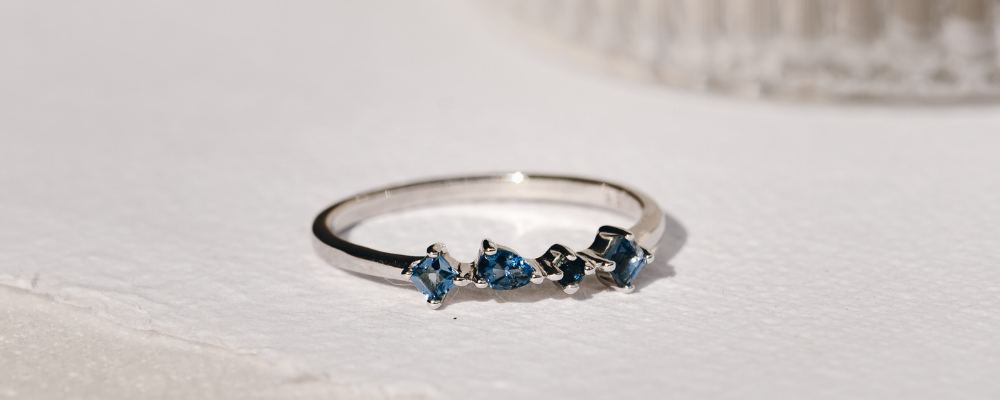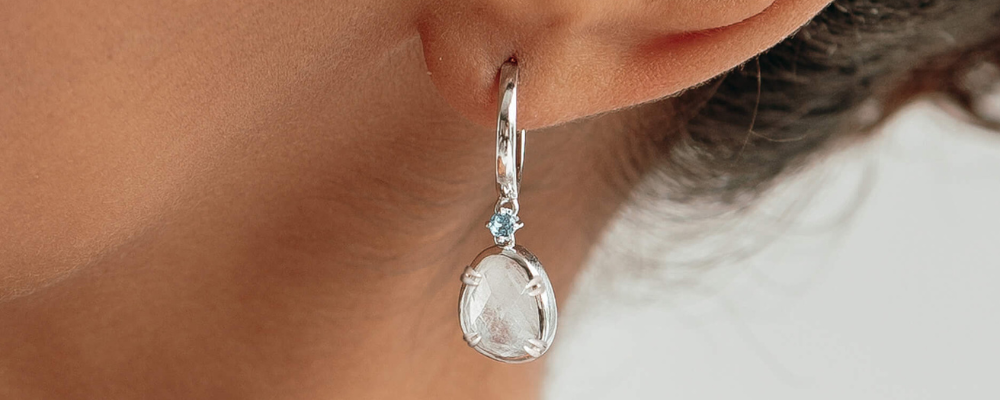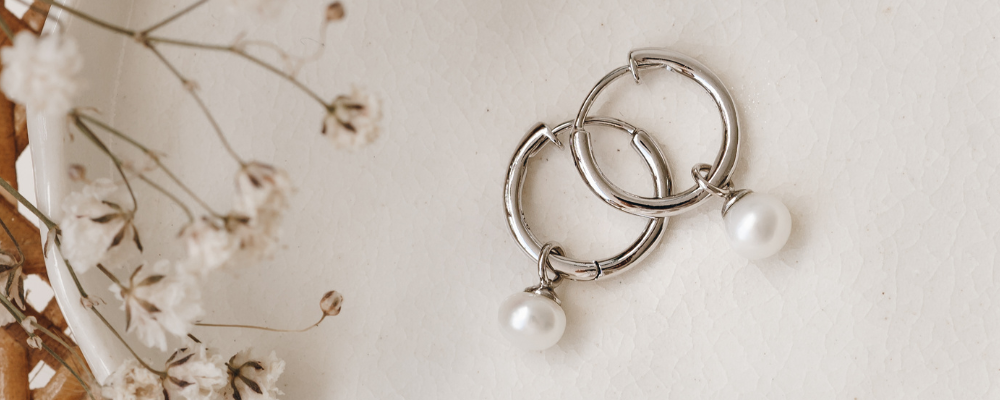Sterling Silver: Your Complete Guide | Linjer Jewelry
Sterling silver is a jewelry metal that has been adored for centuries, thanks to its lustrous shine and timeless elegance. However, what exactly is sterling silver and is it real silver? Let’s explore the history of sterling silver, its properties and characteristics, and answer a few of your burning questions!
What Is Sterling Silver?
Sterling silver (also known as 925 silver) is composed of 92.5% pure silver and 7.5% other metals, typically copper. This composition makes sterling silver stronger and more durable than pure silver, which is too soft and malleable for practical use in jewelry.
Sterling silver’s lustrous shine and hypoallergenic nature makes it an extremely popular choice for jewelry makers and wearers due to its beauty, durability, and versatility.
Shop Our Sterling Silver Jewelry
London Blue Topaz Silver Ring - Ilse |
Pearl Huggie Earrings Silver - Kirsten |

See Product |
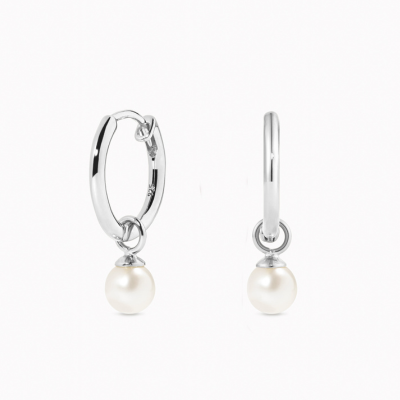
See Product |
Eternity Ring Silver - Olivia |
Mother of Pearl Silver Ring - Margit |

See Product |
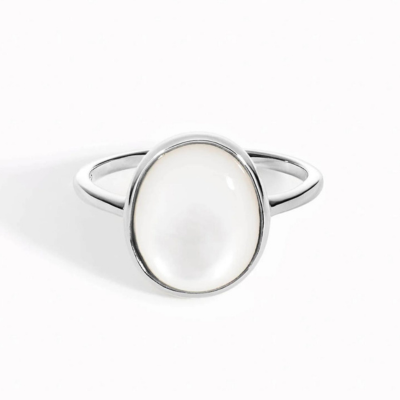
See Product |
History of Sterling Silver
Sterling silver has a rich history that dates back centuries. The term "sterling" has its origins in medieval England, where it was first used to describe a specific type of high-quality silver coin. However, it wasn't until the 13th century that sterling silver became recognized as a standard of purity.
The addition of copper to pure silver made the resulting alloy more durable, leading to its widespread use in decorative pieces, religious objects and of course, jewelry!
Is Sterling Silver Real?
Yes, sterling silver is real silver! However, there are differences between sterling silver and pure silver. Pure silver is made up of 99.9% pure silver, while sterling silver is an alloy made up of 92.5% pure silver and 7.5% other metals. This composition gives sterling silver its unique set of characteristics, including increased durability and resistance to scratches.
The use of pure metals (such as pure gold and pure silver) in jewelry is quite uncommon due to the softness of these metals. That’s why most jewelry makers will opt to use sterling silver (or other alloys) when it comes to crafting jewelry.
Shop Our Sterling Silver Jewelry
Keshi Pearl Earrings Silver - Adriana |
Pearl Drop Earrings Silver - Mathilde |

See Product |
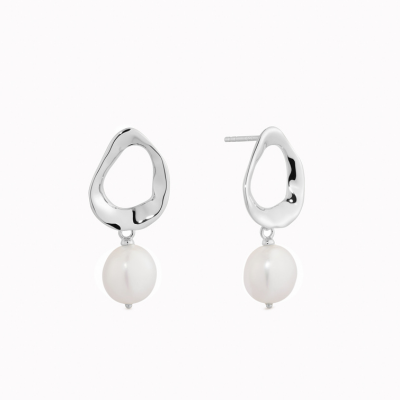
See Product |
Silver Tennis Bracelet (Half) - White |
Mother of Pearl Silver Necklace |
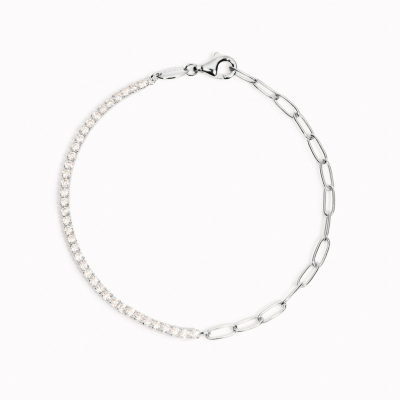
See Product |
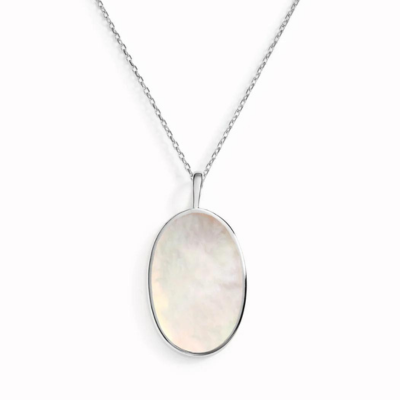
See Product |
Is Sterling Silver Hypoallergenic?
Yes - sterling silver is hypoallergenic for most people, meaning, it’s less likely to cause an allergic reaction! Sterling silver is an alloy composed of 92.5% pure silver and 7.5% other metals, typically copper, which is considered an hypoallergenic material.
How Much Is Sterling Silver Worth?
The value of sterling silver can vary depending on a variety of factors such as supply and demand, economic factors, purity of the silver content, weight and condition of the item.
To estimate its worth, multiply the weight of the item by the current price of silver per troy ounce. The value of sterling silver is subject to market trends, economic factors, and the design, craftsmanship, and historical significance of the item. If you're looking to buy or sell sterling silver, it's important to stay up to date on market trends and fluctuations to make informed decisions.
Shop Our Sterling Silver Jewelry
Moonstone Ring Silver - Elisa |
Moonstone Ring Silver - Lisbeth |
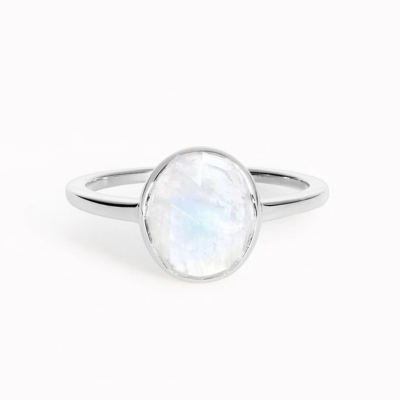
See Product |

See Product |
White Topaz Silver Ring - Ilse |
Silver Stacking Ring - Liv |
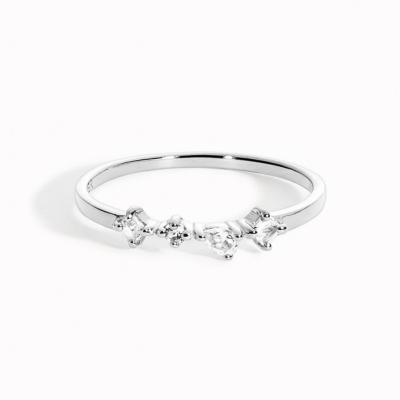
See Product |
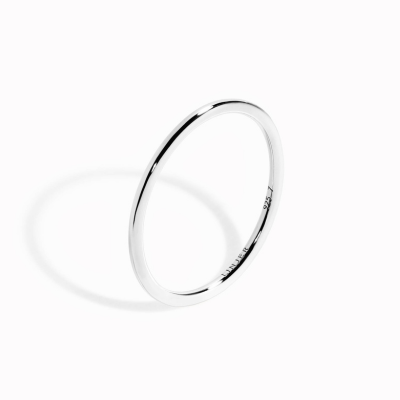
See Product |
What Is Rhodium Plated Sterling Silver?
To care for rhodium plated sterling silver, avoid wearing the jewelry while swimming or bathing. Also be sure to avoid any potential exposure to harsh chemicals or abrasive materials. Regular cleaning and polishing can also help to maintain its appearance. P.S. All of Linjer’s sterling silver jewelry has been plated in rhodium for extra luster and durability!
How to Tell if Something Is Sterling Silver?
To determine whether a piece of jewelry is made of sterling silver, there are a few methods you can use:
- Look for hallmarks and stamps on the item which indicate the quality and purity of the silver. In the United States, the most common hallmark for sterling silver is "925," which indicates that the item is made up of 92.5% pure silver.
- Perform physical and chemical tests to determine the silver content of an item
- Magnet test: Use a magnet to check whether the item is attracted to the magnet. If the item is not magnetic, it’s a good sign that your silver-toned metal is made of sterling silver.
- Nitric test: Apply a drop of nitric acid to the item and observe the reaction. If the item turns a creamy color, it is likely made of sterling silver. If it turns green, it may be silver-plated or made of a lower-quality silver alloy.
- Sterling silver has a distinct sound when tapped, while silver-plated items will sound dull
- Sterling silver is less likely to tarnish than other types of silver, such as silver-plated or nickel silver.
- Sterling silver may have a brighter, more lustrous appearance than other types of silver.
To ensure that your sterling silver is genuine, remember to buy from reputable brands who have a track record of selling high-quality silver jewelry—like Linjer! .
How Long Does Sterling Silver Last?
Sterling silver is a durable and long-lasting material that can withstand daily wear and tear. However, the lifespan of sterling silver varies depending on several factors:
- The amount of wear and use the item receives.
- Exposure to moisture, chemicals, and other substances.
- Proper storage and care.
To ensure that your sterling silver lasts as long as possible, it's important to properly care for and maintain your pieces! This includes storing it in a cool, dry place, avoiding contact with water and chemicals, and cleaning it regularly with a soft cloth. Signs of wear and tear on sterling silver may include tarnish, scratches, or dents. While these can be normal signs of use, it's important to address them promptly to prevent further damage. By taking good care of your sterling silver and addressing any signs of wear and tear, you can enjoy your jewelry for many years to come
Which Is Better, Stainless Steel or Sterling Silver?
When it comes to jewelry, sterling silver is the superior choice over stainless steel. As a precious metal, sterling silver has a lustrous shine and durability that is unmatched by stainless steel.
Stainless steel may be more affordable but it lacks the value and quality of sterling silver, which requires more maintenance, but lasts for years with proper care. Consider the occasion and your personal style when choosing between the two. For high-quality, timeless jewelry, sterling silver is the way to go. Don't settle for less when it comes to your jewelry – choose sterling silver for its beauty, durability, and value!
Should I Buy Sterling Silver or Gold Jewelry?
Choosing between sterling silver or gold jewelry comes down to your budget, occasion and personal style. Gold is a classic choice with a warm tone and is available in a variety of colors based on its alloy. Gold is also a great investment, as its value tends to hold steady over time.
On the other hand, sterling silver jewelry is a more affordable option that still provides a high-quality look and feel. It has a bright, cool-toned shine and is a popular choice for both casual and formal occasions.
Whether you're looking for high-end jewelry for a special occasion or affordable everyday pieces, sterling silver is a great option. At Linjer, we offer a beautiful collection of sterling silver jewelry for every style and occasion. So why not choose quality, choose longevity, and choose sterling silver? Visit our sterling silver jewelry collection page to find your perfect piece today!



